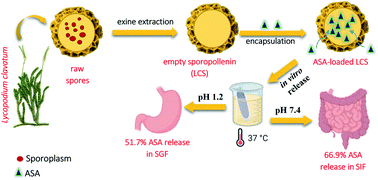Pollen-derived microcapsules for aspirin microencapsulation: in vitro release and physico-chemical studies†
Abstract
Aspirin, also known as acetylsalicylic acid (ASA), is one of the most crucial therapies needed and/or used in a basic health system. Using biocompatible materials to encapsulate ASA would improve its therapeutic efficacy and reduce its side effects via controlled release in physiological environments. Consequently, we explore in this study the feasibility of encapsulation of ASA into robust Lycopodium clavatum L. sporopollenin (LCS) microcapsules. After extracting sporopollenin from their natural micrometer-sized raw spores, the physico-chemical features of the extracted sporopollenin, pure ASA, and sporopollenin loaded with ASA were characterised using various methods, including optical microscopy, Fourier transform infrared spectroscopy (FTIR), ultraviolet-visible (UV-vis.) spectroscopy, thermogravimetric analysis (TGA), scanning electron microscopy (SEM), and X-ray diffraction (XRD). Additionally, we demonstrate the in vitro release profile of ASA in a triggered gastrointestinal environment utilizing kinetics analysis to investigate the mechanism of release. The LCS microcapsules were found to be excellent encapsulants for the crucial ASA drug and achieved controlled in vitro release, that would enable further investigations to rationally design versatile controlled delivery platforms.



 Please wait while we load your content...
Please wait while we load your content...